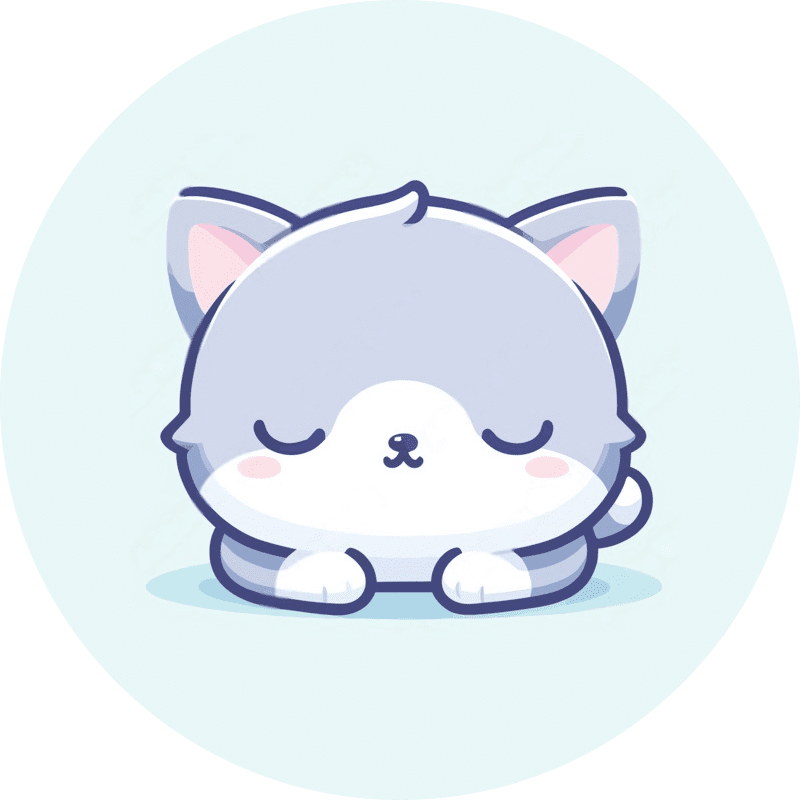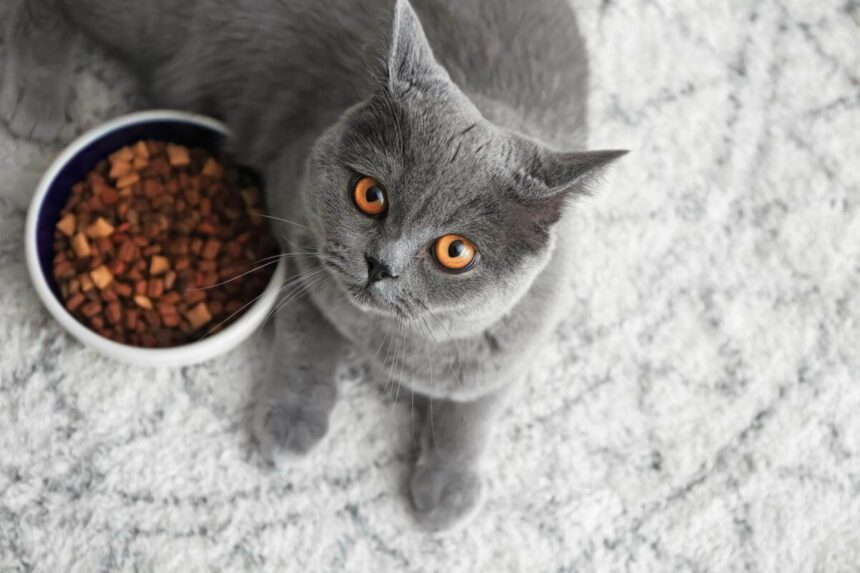If you’re wondering how to give dry cat food the right way, you’ve come to the perfect place.
As a devoted cat lover and seasoned pet expert, I’ve encountered this important part of cat care on more than one occasion.
Let’s dive right in. Transitioning to dry cat food is a gradual process that requires a touch of patience and a dash of understanding.
First, select a high-quality dry cat food that aligns with your cat’s specific needs.
Remember that every furball is different. Ready to set out on this trip full of fun together? Let’s make sure your whiskered companion has a tasty and healthy dinner.
How To Give Dry Cat Food?
I’d be delighted to share my top 5 tips on how to give dry cat food the right way:
1. Portion Control
I always advise talking to your vet about portion control so you can figure out how much dry cat food your feline companion actually requires. Factors such as age, weight, metabolism, and overall health play a crucial role.
Overfeeding, which can result in weight problems, can be avoided by using a measuring cup to ensure precision.
2. Scheduled Meals
Establishing a feeding routine provides your cat with a sense of predictability and helps regulate its digestive system.
I’ve found that feeding them two to three meals a day, at roughly the same times, works wonders.
The “free-feeding” behavior, which involves leaving food out all day and can cause weight gain, is also avoided by this method.
3. Fresh Water Always
Hydration is key to a cat’s well-being. Alongside their dry cat food, always ensure there’s a bowl of fresh water available.
Cats have a low thirst drive, so placing water bowls in different areas of the house can encourage them to drink more.
4. Gradual Transition
Switching your cat’s food suddenly can upset their stomach. To avoid this, take about a week to gradually introduce the new dry cat food.
Mix a small portion of the new food with their current food and gradually increase the proportion until they’re fully transitioned.
5. Storage Matters
Dry cat food must be kept fresh in order to retain its nutritional value. Seal the bag tightly after each use to prevent exposure to air, which can lead to staleness and nutrient degradation.
Storing the bag in a cool, dry place, away from direct sunlight, will help retain its quality.
Even though these suggestions have been really helpful for my furry friends, it’s important to pay attention to how your cat reacts specifically.
You’ll be well on your way to ensuring that they have a healthy and fulfilling mealtime experience if you adapt these recommendations to their specific preferences and requirements.
What Is The Reason For Not Eating Dry Food Of Cats?
I’d be happy to provide some insights into why a cat might refuse to eat dry food:
Sometimes, a cat’s reluctance to eat dry food can be due to dental discomfort. The hard texture of kibble can be challenging for cats with dental issues, making eating uncomfortable.
Palatability is crucial. If the dry food doesn’t match their taste preferences, they might turn their nose up at it.
Knowing your cat’s likes and demands is essential, in my opinion. Dry food has a lower moisture content, which might not align with their natural instincts.
Some cats have sensitive stomachs. Dry food can be harsh on their digestive system, leading to tummy troubles.
Texture matters too. Cats can be selective about texture, and if the kibble size or shape isn’t appealing, they might avoid it.
Certain medical conditions can affect a cat’s appetite. If they’re unwell, they might not feel like eating dry food.
Knowing your cat’s likes and demands is essential, in my opinion. If they’re not eating dry food, consider consulting your vet to rule out any underlying issues and find the best diet for your feline companion.
How Much Dry Food Should A Cat Eat A Day?
Here are some guidelines on how much dry food a cat should eat per day:
Portion size varies, but generally, an adult cat needs about 1/4 to 1/2 cup of dry food per meal.
Considering factors like their age, weight, and activity level helps determine the right portion. Kittens and active cats might need more.
Consulting a veterinarian is wise for precise recommendations tailored to your cat’s specific needs.
Remember, it’s crucial to avoid overfeeding to prevent weight issues. Regularly monitor their body condition to make necessary adjustments.
Observing their eating habits is key. If they consistently leave food, adjust the portion to avoid waste.
In essence, finding the right balance of dry food is an individual journey. Your cat will get the nutrition they need for a healthy and happy life if you adjust the portions to suit their needs.
How Much Dry Food Do You Feed A Cat?
When it comes to feeding a cat dry food, the amount depends on several factors. I recommend consulting your veterinarian for personalized guidance based on your cat’s age, weight, and activity level.
As a rule of thumb, aim for a daily portion of dry food that aligns with their nutritional needs. Don’t overeat because obesity can cause health problems. Consistency is maintained with the use of a measuring cup.
Always remember that the key is to customize the portion to maintain your animal friend’s wellbeing.
Is It OK To Feed Cats Dry Food Only?
Yes, feeding cats dry food only is possible, but it’s essential to ensure they receive proper nutrition. I recommend choosing a high-quality dry food that meets their dietary needs.
However, adding wet meals can provide more hydration, which is important for urinary health. Create a balanced diet plan in consultation with your pet’s doctor.
Frequently Asked Questions
Can I feed my cat solely with dry cat food?
Dry cat food can be a convenient and balanced option, but it’s good to provide some variety in their diet. Mixing in wet food can help maintain hydration.
How often should I feed my cat?
Most adult cats do well with two meals a day, but follow the guidelines on the packaging and adjust based on your cat’s needs.
Is it okay to switch between different dry cat food brands?
If you decide to switch, do so gradually to avoid digestive upsets. Consult your vet if you’re unsure about switching.
Should I be concerned about my cat’s dental health with dry food?
Dry cat food can contribute to dental health, but it’s a good idea to include dental treats and regular check-ups to ensure oral hygiene.
Can I leave dry cat food out all day for my cat to eat as it pleases?
Free feeding isn’t recommended for all cats, as it can lead to overeating and obesity. Controlled portions are generally better.
Final Thoughts
I hope you feel empowered and have gained some useful knowledge as we come to the end of our investigation on feeding dry cat food. Do not forget that each cat is an individual with specific wants and preferences.
You may establish the groundwork for a contented and well-fed feline friend by concentrating on portion control, scheduled meals, maintaining fresh water, gradual transitions, and correct storage.
My path has been filled with learning about and adjusting to the needs of my animal friends as a fellow cat lover. Seeing them grow in good health and take great pleasure in their food is a gratifying experience.
So, go ahead and embark on this kibble adventure with confidence, keeping your whiskered buddy’s best interests at heart. Happy feeding!



